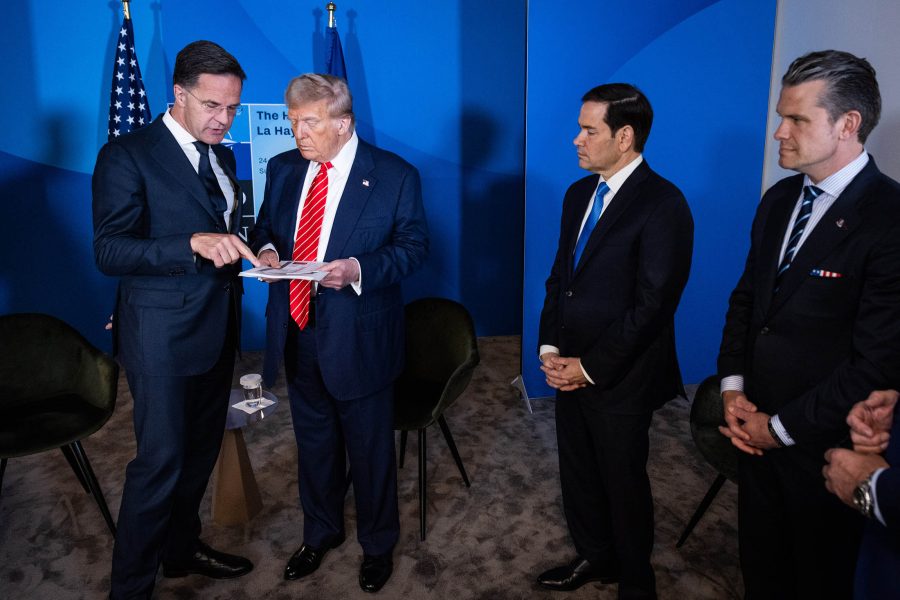NATO members pledged to ramp up military spending at their annual summit as they look to address growing fears about Russia’s ambitions and meet President Donald Trump’s demands that European nations contribute more to their own defense.
The alliance members vowed to try to spend 5 percent of their annual gross domestic product on defense at their June 25 meeting in The Hague, Netherlands.
“United in the face of profound security threats and challenges, in particular the long-term threat posed by Russia to Euro-Atlantic security and the persistent threat of terrorism, Allies commit to invest 5 percent of [gross domestic product] annually on core defense requirements as well as defense- and security-related spending by 2035 to ensure our individual and collective obligations,” The Hague Summit Declaration stated.
Trump has pushed for such a move since 2017, arguing European countries have overly relied on the U.S. nuclear backstop and some 80,000 U.S. troops for security on the continent.
But White House pressure is just one factor. European nations also worry about the durability of America’s commitment to the alliance and fear that Russian President Vladimir Putin may try to wrest control of sovereign territory beyond Ukraine.
Not all NATO nations are expected to meet that goal. Germany, for example, is planning a major increase in defense spending, but Spain has been reluctant to commit to the target. The alliance has no way to enforce a minimum contribution.
To make it easier for the allies to hit 5 percent, NATO has broadened its definition of security spending. Under the alliance’s approach, allies committed to spending 3.5 percent on “core defense requirements” by the middle of the next decade and another 1.5 percent on critical infrastructure, civil preparedness, and their industrial bases. They also pledged closer collaboration on weapons production.
The U.S. spends roughly 3 percent of its GDP on defense and may not meet the 5 percent target itself. But U.S. officials have defended the country’s contribution by noting that Washington has done much of the heavy lifting in past decades and has to pay for other responsibilities worldwide as well.
Though Trump was in the Netherlands for less than 24 hours, he appeared to warm to America’s European allies. The president affirmed his commitment to NATO’s mutual-defense clause, which he had previously suggested the U.S. might not honor.
“They want to protect their country, and they need the United States, and without the United States, it’s not going to be the same,” Trump said in a news conference alongside Defense Secretary Pete Hegseth and Secretary of State Marco Rubio. “I left here saying, ‘These people really love their countries. It’s not a rip-off.’ And we are here to help them protect their country.”
Many leaders had rushed to placate Trump in hopes of retaining U.S. support for the alliance.
“Daddy has to sometimes use strong language,” NATO’s Secretary-General Mark Rutte said, referring to Trump’s criticism of European allies. Lithuanian President Gitanas Nauseda mused that the alliance should adopt a new slogan: “Make NATO Great Again.”
Trump also appeared to mend relations with Ukrainian President Volodymyr Zelenskyy, following a fiery White House meeting earlier this year where the wartime leader was accused of being ungrateful for military aid. Trump expressed frustration with Russian President Vladimir Putin and suggested he may consider supplying Ukraine with more Patriot missile interceptors—a prized defense against ballistic missiles that Kyiv desperately needs.
In a marked departure from previous NATO summits, Ukraine, which is not a member of the alliance, was mentioned in the official declaration only in passing.
But the summit—the outcome of which was largely agreed upon beforehand—seemed to calm nerves about America’s commitment to Europe in the U.S. and abroad, despite the Trump administration’s long-term desire to shift the Pentagon’s focus to the Pacific.
Air Force Lt. Gen. Alexus G. Grynkewich, the nominee to lead U.S. European Command and serve as Supreme Allied Commander of NATO forces, told senators this week that the U.S. should not ignore European security in favor of preparing for a potential conflict with China.
“Our adversaries are converging, and the risks of conflict with one or more of them grow each and every day,” Grynkewich said at his June 24 confirmation hearing. “While the Indo-Pacific has risen in importance over the previous two decades, European and American security remain as intertwined as our history, our cultures, and our economies. As such, a strong NATO capable of defending Europe remains essential to American interests.”
Speaking in Washington on June 25, the U.S. Army’s top general in Europe said he did not believe America would downsize its forces on the continent—a comment reinforced by Army officials speaking to reporters later in the day.
“I don’t think that our force posture is going to change at all in Europe,” Gen. Chris Donahue said at an event hosted by the Association of the United States Army. “Nobody has said anything to me about it.”
“We have a deterrence problem in Europe, and everybody’s got to step up,” he added. “We don’t need to generate drama. Just look at the facts. Do what’s right.”
In the end, Donahue said, “the U.S. military will always lead in Europe.”
